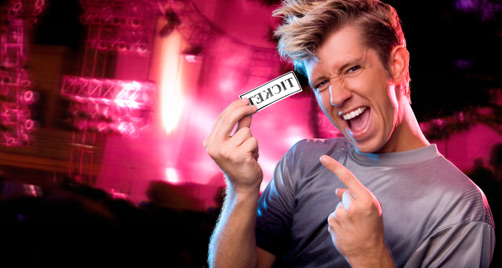
22 Jul Reasons It’s So Difficult To Purchase Concert Tickets
Maybe this has happened to you: You get excited about a concert, and make a point of visiting Ticketmaster just as tickets are about to go on sale. You wonder why this happens and how you can avoid getting shut out in the future.
Sad to say, but unless you have some serious connections, there’s really not much you can do to get around this problem without throwing down serious cash. The concert industry is a rather unforgiving market that thrives when high demand coincides with scarcity, and there are several forces competing to either acquire tickets or maximize the profits made off those tickets.
Tickets for hot shows are set aside for various guest lists, credit card presale promotions, and fan club presales before the general sale, and in some cases, a majority of the tickets are long gone prior to regular fans get a crack at buying tickets. And then you have to contend with scalpers! It’s almost impossible.
To acquire an idea of exactly how bad this can get, here’s the breakdown of how tickets were dispersed for a Justin Bieber concert at the Bridgestone Arena in Nashville on Jan 18: Out of nearly 14,000 available seats for the show, only 1,001 seats were available for purchase when the general sale began on Ticketmaster on May 23. This is fairly common at popular arena gigs, and it happens on a smaller scale for hot shows at clubs and theaters.
1. Credit card presales can take a big bite out of the pie.
Credit card companies such as American Express and Citi routinely host special presales for cardholders and can claim a majority of available tickets for concerts by superstar acts that are guaranteed to sell out. Credit card companies help promote the concerts, and the exclusive presales give consumers incentive to get premium credit cards. “Brokers snatch up at least 50 %, if not more, of these tickets,” says Josh Baron, coauthor of Ticket Masters: The Rise of the Concert Industry and How the Public Got Scalped, noting that scalpers typically use multiple credit cards to pick up these tickets and flip them on StubHub, TicketsNow, and other legit secondary market sites.
2. Tickets get set aside for the artist’s fan club.
Fan club presales are designed to give an act’s most hardcore fans an early opportunity to score good seats at acceptable prices. This is mostly a positive thing, but as with all presales, it reduces the number of tickets available in the general sale. When U2’s long-running fan club Propaganda was transferred over to Live Nation in 2005, their seniority ranking system was erased, which resulted in a great many tickets reserved for fan club members ending up in the hands of scalpers. Fan clubs for newer artists like Justin Bieber have been gamed from the start, with industrious scalpers joining up early on, anticipating long-term demand for tickets for his shows. “Many [scalpers] have multiple credit cards so they have plenty of opportunities to be part of those presales,” Ticket Masters coauthor Dean Budnick told NewsChannel5. “Many of them pay the money, if they need to, or simply divulge a variety of email addresses they have to be part of those fan clubs.”
3. Many artists scalp their own tickets.
Managers– and sometimes artists themselves– regularly sell their allotment of tickets on the secondary market to the highest bidders. This has been going on for decades, and though it sounds sleazy, they’re legally in the clear.
This practice is prevalent in the concert industry, but it’s very rare that anyone is called out on it, though Katy Perry was outed for doing this when The Smoking Gun posted her tour rider in 2011. Here’s the language her management used in the rider: Artists and managers do this in order to get paid the actual market value for their best tickets and keep that money from going to scalpers. “It’s a tough position for an artist to be in when they realize that a good portion of the best tickets in the house are going to end up on the secondary market and they’re going to be going for five times the face value,” says Baron. In a perverse way, buying a ticket that an artist has directly placed in the secondary market is the only way to make sure your money is going directly to an artist, since it drastically reduces the number of middlemen taking a cut of the ticket price.
4. Oh, and then there’s guest list and VIP.
Guest list tickets are rarely an issue in most cities, but can be a big problem in industry towns like New York City, Los Angeles, and Nashville. Labels and managers buy tickets for guest list, and those tickets are given away for free to friends and family, industry, and press figures at their discretion. The number of tickets set aside for this purpose can vary wildly, but there are occasions when a large number of available tickets for a small gig will be reserved for this if the show is intended mainly to generate press for the artist. This happens at large venues too, albeit more rarely.
Though some people on an artist’s guest list will be given VIP access, guest list tickets are not to be confused with VIP tickets, which have become another category of ticket sales in recent years. VIP tickets are sold at a premium, and include a brief meet-and-greet backstage, special T-shirts and posters, along with good seats for the show.
5. You sometimes have to compete with scalper bots once tickets go on sale to the general public.
Scalper bots are programs designed to flood a particular on-sale with requests for tickets in order to increase the odds of scoring tickets and maximize the number of tickets that can be purchased at once. They are sophisticated programs that can be custom-built for a regular user, or more generically designed and leased out. Captcha was designed to weed out bots, but scalpers have learned to circumvent this with a method called “manual turk,” in which a pool of outsourced workers– usually in India or the Philippines– manually type in the Captcha text after the initial work is done by the bots. Bots have become less popular among ticket brokers over the years, particularly as those people have worked to legitimize their business. Still, there are plenty of scalpers using bots today, and on some occasions, bot activity can crash Ticketmaster’s systems.
6. If you beat the odds and score tickets, you get slammed with inflated service fees.
Ticket service fees vary a great deal, depending on the venue and the artist. This wasn’t always the case. “The guy that changed the game for this is Fred Rosen,” says Baron. “He was the CEO of Ticketmaster for a long time. For years there was maybe two or three different price points in a concert venue. There’s more now, but they would charge the same service fee. Fred’s point was that the person who’s paying twice as much for a ticket is also willing to pay twice as much for a service fee.”
Ticketmaster has deals with most major venues that lay out a basic facility service fee, and that money goes into many different things, from covering labor costs to funding the upkeep or renovation of the venue. Ticketmaster’s own fees generally go toward covering the company’s infrastructure. Major artists such as Paul McCartney and Neil Young can use their leverage to negotiate adjustments to those fees so that they can get a chunk of that revenue. Some artists use this trick in order to set the base cost of their tickets at a price point that seems reasonable. When the actual price is driven up by service fees, fans blame Ticketmaster, and the artist gets to maintain the image of being the “good guy” even if a chunk of that inflated service fee goes directly to them. More often, fees of up to $25 are added to the most expensive tickets in the house, mainly on Rosen’s logic that people with pockets deep enough to afford those tickets in the first place won’t really notice or care.
Therefore, if you plan to acquire a concert tickets then you have to avoid these difficult reasons. Also, if you need a transportation service for a certain concert and events, then bus rental New England can help you provide round trip transport for your group.



No Comments